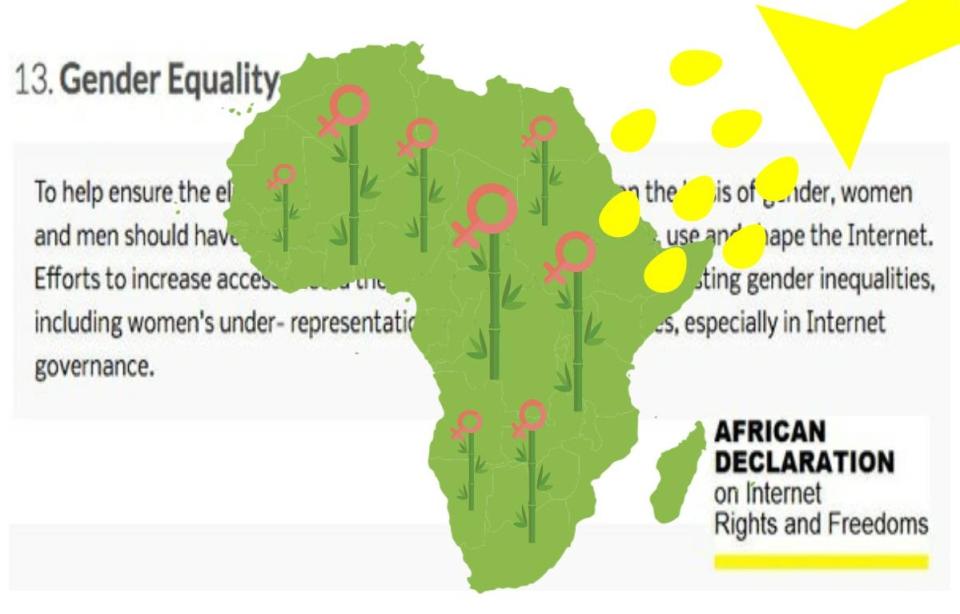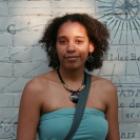
From access to action
Women in West and Central Africa are also, as are their continental counterparts, on the wrong side of the gender digital divide.
In West and Central Africa, feminist organising has often been fractured at a regional level. This is due in part to the language barrier – which is a direct result of colonisation – between mainly French-, English- and Portuguese-speaking countries, as well as the numerous local languages that are present in the sub-region. Except for Nigeria and Senegal, which have more than 50% [1] of their populations connected, most countries in the region still have a long way to go to democratise access to the internet, and there are serious efforts to be made to ensure equal access.
Women in West and Central Africa are also, as are their continental counterparts, on the wrong side of the gender digital divide due to many socioeconomic, cultural and political factors. [2] While access to the internet, especially via mobile devices, [3] has opened new ways of organising and offered a relatively safer environment for women's rights activists to circumvent taboos and punitive legislation, internet access is still expensive and reflects the linguistic divide of the subregion, with English-speaking countries' feminist voices being more present online.
As Calandro, Stork and Gillwald note in their 2012 policy brief, social media platforms on the continent are on the verge of being the medium of communication of choice over email. What Dana Boyd calls "networked publics" [4] – publics that are created out of online communities of people – have become an important lifeline for women's rights and particularly sexual rights activists in the sub-region. They are able to access a collection of people beyond physical communities and family that support the crucial work their organisations and informal collectives engage in and through this to commonly establish dreams and demands. [5]
The Coalition of African Lesbians (CAL) began mapping the women's sexual rights movement in West and Central Africa in 2015. Alongside a mapping exercise conducted by the Queer African Youth Network (QAYN), both portraits of the sub-region show that while organising still happens largely in physical spaces, there is an increasing use of various information and communications technologies (ICTs) – from social networks to mobile apps – to communicate, inform and mobilise. With this use of ICTs, we have seen a growing concern among activists in dealing with a whole new range of security and safety issues in what is often an extremely hostile environment. We also see a strong desire from movements in the region to move beyond identity politics and activisms focused on health (for example, the fight against HIV/AIDS) to larger intersectional issues.
From the African Declaration to the Feminist Principles
The African Declaration of Internet Rights and Freedoms is a pan-African initiative to respond to the challenge of protecting human rights and freedoms on the internet. While communications rights activists have pushed forward the Declaration, there has been little involvement from the women's rights and sexual rights movements of the sub-region in debates related to internet governance, freedoms and rights that could potentially or are already influencing their capacity to discuss, mobilise and organise online. Significantly, the African Declaration has enshrined in its principles questions of linguistic diversity, freedom of assembly and association, and freedom of expression, to name a few. An analysis of these principles through the feminist lenses of the continent could be an interesting addition to the debates and the discussions.
Article 10 of the African Declaration addresses marginalised groups and groups at risk, demanding their right to use the internet for the “exercise and enjoyment of their human rights”. Article 13 on gender equality states:
To help ensure the elimination of all forms of discrimination on the basis of gender, women and men should have equal access to learn about, define, access, use and shape the Internet. Efforts to increase access should therefore recognise and redress existing gender inequalities, including women’s under-representation in decision-making roles, especially in internet governance.
Both these articles highlight the importance of achieving equality and protecting the rights of marginalised people. However, notions of "public order" and "morals" expressed in Article 3 on freedom of expression could potentially limit the scope of what sexual rights and women's rights activists can do or say online. Human rights spaces and processes on the continent, like the African Commission on Human and Peoples' Rights (ACHPR), are still extremely difficult to navigate for sexual rights activists: CAL's observer status to the Commission, which was granted in great controversy in 2015, is at risk of being revoked by the Commission under recommendation of its parent body, the African Union. In the context of a continent where homosexuality and abortion are still considered by many decision makers and religious leaders to be against African "values" and "morals" and where legislation, often still reflecting colonial laws, is either silent or repressive on the rights of women and of LGBTQ persons, [6] this article could open the door to various interpretations with regard to freedom of expression. Principle 13 of the Feminist Principles of the Internet does, however, set the scene for a revision of the African Declaration.
We strongly object to the efforts of state and non-state actors to control, regulate and restrict the sexual lives of consenting people and how this is expressed and practised on the internet. We recognise this as part of the larger political project of moral policing, censorship and hierarchisation of citizenship and rights.
In addition, the African Declaration of Internet Rights should go further in addressing violence online as part of the continuum of gender-based violence and violence based on sexual orientation. Principle 4 of the Feminist Principles of the Internet establishes parameters that could contribute to the declaration as well as the recently adopted Resolution 275 of the ACHPR on the “Protection against Violence and other Human Rights Violations against Persons on the basis of their real or imputed Sexual Orientation or Gender Identity”. [7]
Decolonising the internet
As African women's rights and sexual rights activists, we are often spoken for and spoken of as subalterns, but don't often control our narrative.
Through our mapping of the sexual rights movement in West and Central Africa, we have found that activists tend to work in linguistic silos (French/English) and know very little of each others' struggles. Colonial languages are deeply rooted in the daily communications of people on the continent, which leads in part to very little online representation of the linguistic diversity of the sub-region and the continent. For example, there are many local languages spoken besides French or English, such as Bambara in Mali, which is spoken by approximately 15 million people. The information, debates and exchanges on feminism online are dominated by Anglophone Northern voices. If we take a closer look at the continent, we see it is dominated by African Anglophone countries, due in part to their linguistic proximity with wider transnational women's rights and sexual rights movements who use English as their lingua franca. As African women's rights and sexual rights activists, we are often spoken for and spoken of as subalterns, but don't often control our narrative. Desiree Lewis argues:
Those who wield power in the present age also wield control over and access to knowledge: knowledge circulated via the World Wide Web, information – promulgated in institutions of higher learning – that often only appears progressive; “public” information ostensibly aimed at marginalised groups, yet concerned least with their interests and most with profit-making. [8]
The Feminist Principles of the Internet also reflect on economic power and access and the relationship between capitalism and patriarchy. This is particularly important at a time in the region when the discourse of women's rights and sexual rights is being harnessed by some states to further neoliberal agendas in the guise of "equality". The intersectional approach of the Feminist Principles of the Internet is critical as it allows a deeper interrogation of the different ways in which patriarchy is both reproduced and resisted. It is therefore essential that we question and interrogate policies that are commensurate with the patriarchal and neoliberal order, including the ones that shape the internet, to allow ourselves to truly imagine an African feminist internet.
While the first organised women's movements in West Africa were often integrated in liberation movements, the focus on anti-colonial and anti-imperialist struggles often took precedence over the fight against the patriarchal order. [9] Feminist thinkers in the sub-region have moved more recently to locate their interventions in the context of decolonising feminist ideas – examining feminism in the African context and constructing a feminist discourse that is from and by women of the continent. Alongside debates around capitalism, neo-colonialism and economic power, we must reflect on what it means for African black bodies to occupy an online space that is essentially a mirror of the power imbalance between the North and the South, and where Northern corporations profit from and control the increasing participation of the South in the creation of networked publics.[10] In the West and Central African context, these power imbalances must also be examined under linguistic lenses within our movements, if we aim to bridge the digital divide between our linguistic solitudes. Our lived online experiences of both gendered and racialised bodies are existing in a space that is at the same time reinforcing patriarchal and racist stereotypes as well as resisting these constructs.
We must build our African online feminisms on our own terms, producing discourses that challenge the status quo while participating in decision-making spaces that shape the internet. Online spaces offer us the possibility to narrow the gap between our struggles and to be able to extend our activism in the way we theorise pan-Africanism.
I am because you are.
[1] Internet World Stats. Internet Usage Statistics for Africa. November 2015. www.internetworldstats.com/stats1.htm
[2] Hafkin, N., & Huyer S. (2007). Engendering the Knowledge Society: Measuring Women's Participation. Montreal: Orbicom, NRC Press.
[3] Calandro E., Stork C., & Gillwald A. (2012). Internet Going Mobile: Internet access and usage in 11 African countries. Research ICT Africa. www.researchictafrica.net/publications/Country_Specific_Policy_Briefs/In...
[4] Boyd, D. (2011). Social Network Sites as Networked Publics. In Z. Papacharissi (Ed.), A Networked Self: Identity, Community and Culture on Social Network Sites. New York: Routledge.
[5] Salami, M. (2014, 5 May). The Coming of (Digital) Age: How African Feminists Are Using the Internet to Change Women's Lives. GenderIT.org. www.genderit.org/node/4027
[6] Armisen, M. (2016). We Exist: Mapping LGBTQ Organizing in West Africa. Queer African Youth Network. https://static1.squarespace.com/static/54191049e4b0677471aa06c9/t/56eaf7...
[7] http://www.achpr.org/sessions/55th/resolutions/275/
[8] Lewis, D. (2006). Discursive Challenges for African Feminisms. Quest: An African Journal of Philosophy/Revue Africaine de Philosophie, XX, 78.
[9] Colin, A. (2012). Mouvements féministes en Afrique. Revue Tiers Monde, 1(209), 145-160. www.cairn.info/revue-tiers-monde-2012-1-page-145.htm
[10] Palmieri, J. (2011). Genre et société numérique colonialitaire – Effets politiques des usages de l'Internet par des organisations de femmes ou féministes en contexte de domination masculine et colonialitaire: les cas de l'Afrique du Sud et du Sénégal. Thèse pour le Doctorat en Science politique, Institut d'études politiques de Bordeaux. https://tel.archives-ouvertes.fr/tel-00709266/document
- 13841 views






Add new comment